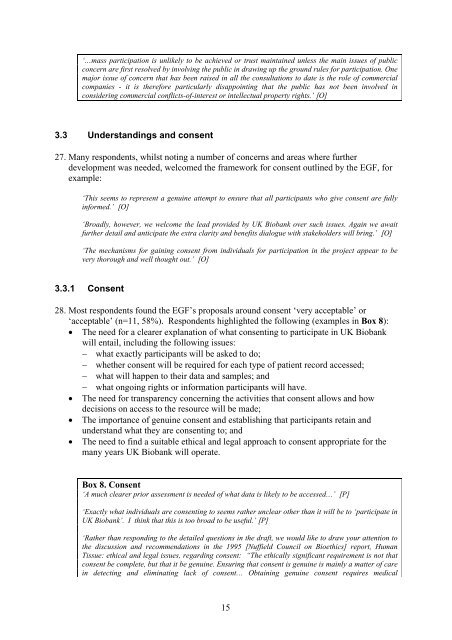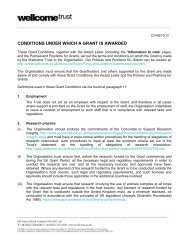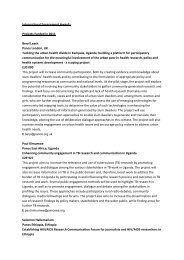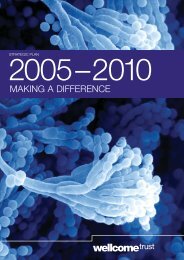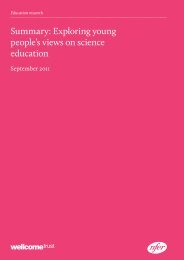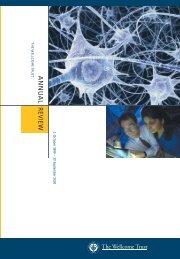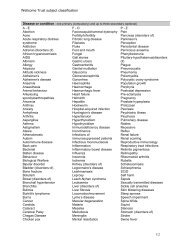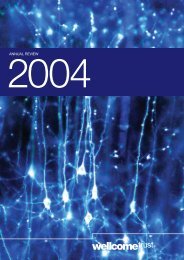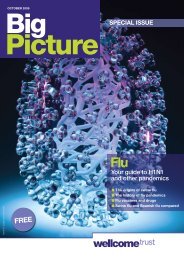‘[Another] barrier concerns GPs who may not as yet have computerised all their records, <strong>and</strong> whateffect this may have on recruitment as well as the following up of medical histories. The Biobankrecruitment <strong>and</strong> follow-up will be taking place in parallel with major additional investment in commonNHS IT programmes that will affect the storage of medical records.’ [O]25. Respondents requested more details of how patient data would be accessed; what patientdata might be collected; how it would be stored; <strong>and</strong>, how it might be used in researchprojects. A small number of organisations requested that they be consulted again whenmore detail was available on recruitment <strong>and</strong> enrolment.Box 6. Data requirements, uses <strong>and</strong> protection‘Our view, is that it is not appropriate for researchers to be given the names of potential researchparticipants, since this would constitute a breach of confidentiality. We receive a steady stream ofcomplaints from patients <strong>and</strong> doctors when patients have received unsolicited letters from researchersabout participation in a project, since it is clear that their personal details have been passed to anindividual unconnected with their care without their consent. Some patients also feel pressure to agreeif they are approached directly by the researchers.’ [O]‘In terms of compliance with the Data Protection Act 1998, the basis on which individuals are enrolledinto the project will be a key issue. In so far as involvement in the project will lead to records aboutliving, identifiable individuals being kept, the data protection principles will need to be complied with.This means that individuals must be properly informed of the identity of the body keeping informationabout them, of the purposes for which information about them is to be processed, <strong>and</strong> any otherinformation necessary to make the processing of the information fair. The latter requirement may meantelling individuals about the disclosure of information about them, or whether the research results willbe exploited commercially. In particular, the research body must ensure that no one is deceived ormisled whilst being enrolled into the project. The objective here is transparency, <strong>and</strong> there is no reasonwhy this should not be achieved given clear, truthful enrollment procedures.’ [O]‘We are not entirely sure how, precisely, researchers will make initial contact with volunteers. From adata protection perspective, a good solution would be for the doctor him or herself or the NHS <strong>Trust</strong> toselect patients fitting the research criteria, <strong>and</strong> for the doctor or <strong>Trust</strong> to issue invitations forparticipation in the project. This would avoid any unconsented disclosure of confidential personalinformation about patients. An unconsented disclosure of confidential personal data could constitute abreach of the 1 st data protection principle. Doctors <strong>and</strong> other record holders involved in the researchproject should also be mindful of the relevant professional rules, for example those issued by theGeneral Medical Council.’ [O]‘Little thought seems to have been given to explaining to participants about the use of their geneticinformation, even if anonymised, by commercial firms. Exactly what will be done about the patient whorefuses, as I myself would do, on the grounds that an altruistically-based NHS should not be supportingcommercial research.’ [P]26. A number of respondents noted activities that if undertaken might support the recruitmentprocess <strong>and</strong> enable greater participation (Box 7).Box 7. Ensuring participation‘<strong>UK</strong> Biobank could consider providing potential participants with examples of how a betterunderst<strong>and</strong>ing of disease <strong>and</strong> disease processes has resulted in significant reductions in morbidity <strong>and</strong>mortality (eg underst<strong>and</strong>ing infectious diseases paved the way for strategies to combat infections,including therapeutic interventions).’ [O]‘The <strong>UK</strong> Biobank project needs to be very high profile in the media to ensure that potentialparticipants know the background <strong>and</strong> aims of the project when approached.’ [O]14
‘…mass participation is unlikely to be achieved or trust maintained unless the main issues of publicconcern are first resolved by involving the public in drawing up the ground rules for participation. Onemajor issue of concern that has been raised in all the consultations to date is the role of commercialcompanies - it is therefore particularly disappointing that the public has not been involved inconsidering commercial conflicts-of-interest or intellectual property rights.’ [O]3.3 Underst<strong>and</strong>ings <strong>and</strong> consent27. Many respondents, whilst noting a number of concerns <strong>and</strong> areas where furtherdevelopment was needed, welcomed the framework for consent outlined by the EGF, forexample:‘This seems to represent a genuine attempt to ensure that all participants who give consent are fullyinformed.’ [O]‘Broadly, however, we welcome the lead provided by <strong>UK</strong> Biobank over such issues. Again we awaitfurther detail <strong>and</strong> anticipate the extra clarity <strong>and</strong> benefits dialogue with stakeholders will bring.’ [O]‘The mechanisms for gaining consent from individuals for participation in the project appear to bevery thorough <strong>and</strong> well thought out.’ [O]3.3.1 Consent28. Most respondents found the EGF’s proposals around consent ‘very acceptable’ or‘acceptable’ (n=11, 58%). Respondents highlighted the following (examples in Box 8):• The need for a clearer explanation of what consenting to participate in <strong>UK</strong> Biobankwill entail, including the following issues:− what exactly participants will be asked to do;− whether consent will be required for each type of patient record accessed;− what will happen to their data <strong>and</strong> samples; <strong>and</strong>− what ongoing rights or information participants will have.• The need for transparency concerning the activities that consent allows <strong>and</strong> howdecisions on access to the resource will be made;• The importance of genuine consent <strong>and</strong> establishing that participants retain <strong>and</strong>underst<strong>and</strong> what they are consenting to; <strong>and</strong>• The need to find a suitable ethical <strong>and</strong> legal approach to consent appropriate for themany years <strong>UK</strong> Biobank will operate.Box 8. Consent‘A much clearer prior assessment is needed of what data is likely to be accessed…’ [P]‘Exactly what individuals are consenting to seems rather unclear other than it will be to ‘participate in<strong>UK</strong> Biobank’. I think that this is too broad to be useful.’ [P]‘Rather than responding to the detailed questions in the draft, we would like to draw your attention tothe discussion <strong>and</strong> recommendations in the 1995 [Nuffield Council on Bioethics] report, HumanTissue: ethical <strong>and</strong> legal issues, regarding consent: “The ethically significant requirement is not thatconsent be complete, but that it be genuine. Ensuring that consent is genuine is mainly a matter of carein detecting <strong>and</strong> eliminating lack of consent… Obtaining genuine consent requires medical15


